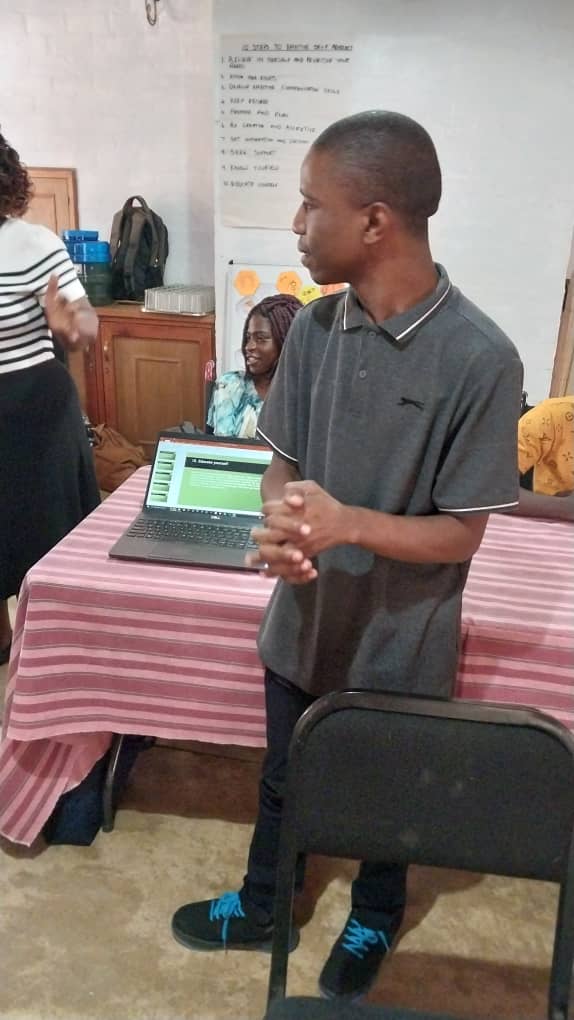|
Getting your Trinity Audio player ready...
|
Zimbabwe Parents of Handicapped Children’s Association (ZPHCA) recently hosted the Youth with Disability Peer Learning Exchange Feedback Meeting in Harare.
More than 30 youth with disabilities from various neighbourhoods of the greater Harare Province attended. The event was facilitated by Emilia July, Thomas Chanduru, and Fungai Muchoko. The 3 facilitators are all part of the NOREC Funded Youth with Disability Leadership and Advocacy Peer Learning and Cultural Exchange Program 2023 involving youth from Zimbabwe, Kenya, and Zanzibar.
Thomas Chanduru was in Zanzibar for 6 Months on a Youth Peer Learning Exchange. Emilia July was in Kenya for peer learning and cultural exchange while Fungai Muchoko was based here in Harare and managed to interface with 2 participants from Kenya and Zanzibar who also spent 6 months here in Harare on Peer Learning and Cultural Exchange Program.
Theresa Makwara, the ZPHCA Director was the Guest of Honor at the Feedback Meeting. Also in attendance were the ZPHCA board members, civil society organizations, parents, support group leaders, stakeholders, community leaders, volunteers, and ZPHCA staff members.
The theme of the feedback meeting was: ‘‘YOUTH WITH DISABILITIES PEER LEARNING & CULTURAL EXCHANGE TRANSFORMING LIVES’’.
“The Planning and Feedback Meeting was aimed at offering a perfect opportunity for youth participating in the Norec-funded peer learning and cultural exchange program to share and cascade the knowledge, information, experience, and skills gained while on attachment in Zimbabwe, Kenya, and Zanzibar.
“The Planning and Feedback Meeting managed to create a conducive youth-friendly engagement and dialoguing between youth with disabilities and stakeholders in attendance,” Makwara said.
Below, we highlight some of the challenges:
Limited Educational Opportunities
A majority of children with disabilities are less or not educated at all. Thus their level of participation in the socioeconomic arena is limited. They are unlikely to be accorded equal access to programs that empower the general populace as the majority are illiterate. Such children miss out on employment opportunities in their future adult lives and hence are entranced in the vicious circles of poverty, abuse, and exploitation (children with disabilities risk being born in poor families, growing up poor, and dying poor).
Lack of Health Services
Due to the poor economic background of the parents of children with disabilities, their medical needs cannot be adequately catered for. Children with disabilities lack access to constant rehabilitation services including disability assessments, therapies, assistive devices, and medication, a situation exposing children to secondary disabilities.
Lack of Assistive Devices
Children with disabilities and their families lack the capacity to acquire special appliances to aid them whether they are crutches, wheelchairs, hearing aids, braille, and artificial limbs amongst others. Lack of movement limits children’s participation at school and during community development programs. •
Poverty
Lack of resources and support base creates a circle of poverty, vulnerability, and exposure to exploitation for children with disabilities. Children growing up in poverty if not supported to get an education, entrepreneurship skills, vocational skills, and employment opportunities, risk dying in poverty, leaving behind a poverty legacy for their children as well.
Public building accessibility challenges
Children with disabilities cannot easily access public buildings to access services offered by service providers due to the discriminatory manner in which public buildings were built. Even where some buildings have provisions for wheelchairs, people with disabilities may require additional assistance. Reasonable Accommodation needs to be prioritised by services providers in the public and private sectors.
Public Transport Challenges
Public transport operators shun the disabled as they do not cater for the space to accommodate the wheelchairs, even where it is foldable. The way the vehicles are designed also makes it difficult for the disabled to board the vehicles.
Lack of Disabilities-Friendly Sporting Facilities
Children with disabilities’ talents are never realized because there are few opportunities for them to participate in sports, arts, and culture sectors at all levels. Those who may have been identified will have to access special appliances or facilities in order to participate. Most of the appliances come dear and facilities are expensive to maintain. Considering their poor economic status, it becomes a pipe dream.
Stigma and Discrimination
Youth with disabilities also suffer from socio/emotional and psychological challenges due to the way society views persons with disabilities. People usually pass comments and remarks that are insensitive and derogatory words when referring to children with disabilities for example Chirema (disabled).
Lack of Sexual and Reproductive Health Services
Youth with disabilities have little access to sexual and reproductive education, reproductive kits, and general health information. They usually lack family planning, knowledge, and access to information on reproductive health services. Some youth with disabilities are physically and sexually abused because they lack information on their rights, and power to negotiate safe sex while some cannot speak out.
By the time the abuse is discovered, it will be too late to get proper and correct treatment leading to unwanted pregnancies, death, and exposure to HIV/AIDS pandemic and STIs.
Exposure to Disasters
COVID-19, climate change, floods, and other disasters have adversely affected children with disabilities as they have been excluded from special education on disasters, particularly early warning systems, disaster prevention, preparedness, response, and recovery programs.






